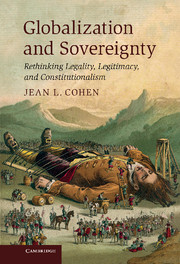Book contents
- Frontmatter
- Contents
- Preface
- Introduction
- 1 Sovereignty in the context of globalization: a constitutional pluralist approach
- 2 Constitutionalism and political form: rethinking federation
- 3 International human rights, sovereignty, and global governance: toward a new political conception
- 4 Sovereignty and human rights in “post-conflict” constitution-making: toward a jus post bellum for “interim occupations”
- 5 Security Council activism in the “war on terror”: legality and legitimacy reconsidered
- Conclusion
- Notes
- Bibliography
- Index
2 - Constitutionalism and political form: rethinking federation
Published online by Cambridge University Press: 05 August 2012
- Frontmatter
- Contents
- Preface
- Introduction
- 1 Sovereignty in the context of globalization: a constitutional pluralist approach
- 2 Constitutionalism and political form: rethinking federation
- 3 International human rights, sovereignty, and global governance: toward a new political conception
- 4 Sovereignty and human rights in “post-conflict” constitution-making: toward a jus post bellum for “interim occupations”
- 5 Security Council activism in the “war on terror”: legality and legitimacy reconsidered
- Conclusion
- Notes
- Bibliography
- Index
Summary
Two apparently contradictory trends since the mid-1970s, call for creative thinking regarding constitutional and political forms. The first is the striking “contagion of sovereignty” as a discourse and claim, culminating in the universalization of the legal and political form of the sovereign national state – initially in the context of decolonization (the 1970s) and subsequently in the aftermath of the decomposition of the great land-based empire of the Soviet Union (post-1989). The strong norms against conquest and forced annexation imposed post-1945, but especially in the post-colonial epoch, and the remarkable decline of violent state death seem to indicate that the ideal of the self-determining sovereign national state with internationally recognized borders, autonomous constitutional and political structures, and international legal standing has become the norm today. There are now approximately 192 sovereign states recognized by international law and enjoying UN membership, each of which clings tenaciously to its sovereignty. New polities continue to aspire to recognition as sovereign states and to join the UN. Nevertheless the legitimacy and efficacy of state sovereignty seem to be undermined by undeniable ideological transformations, global legal developments, and structural trends.
Indeed, and second, the nation-state and the traditional conception of sovereignty that went with it came under great stress in the same period as its universalization and remain so today for a number of reasons. The ideal (myth?) of “one nation–one state” linked to the principle of self-determination was already unobtainable for the newly emerging polities particularly in South Asia and Africa in the period of decolonization. The “cleansing” of ethnic/religious/linguistic plurality that would be required to instantiate this ideal is now considered unacceptable. Instead of nation-states there are sovereign “state-nations”: multinational, multiethnic states are the norm today. The homogeneous nation-state, always a myth, is deemed an anachronistic and destructive ideal.
- Type
- Chapter
- Information
- Globalization and SovereigntyRethinking Legality, Legitimacy, and Constitutionalism, pp. 80 - 158Publisher: Cambridge University PressPrint publication year: 2012
- 1
- Cited by



